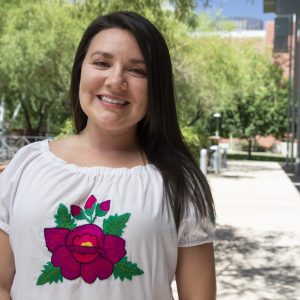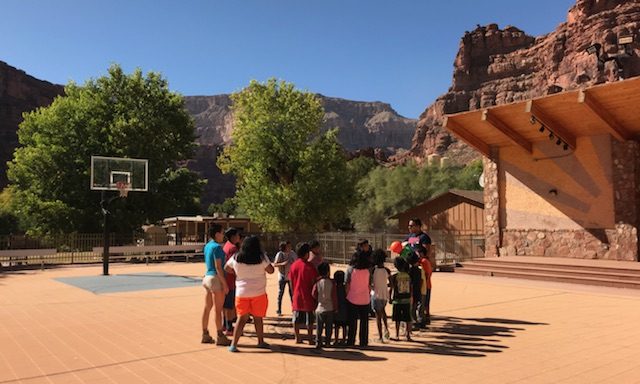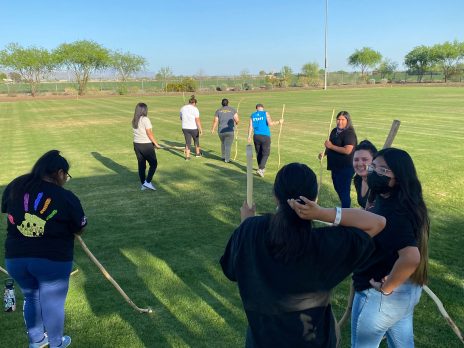Fairness First Blog
Researchers voices in health equity
The Fairness First blog represents a space where researchers share with the broader community why health equity research matters to them, how do they connect to health equity, and what is the value of community engagement in the research process.
October 6, 2023
Native Spirit: Development, implementation, and evaluation of a culturally grounded after-school program with Amanda Hunter
Postdoctoral Scholar, Center for Community Health and Engaged Research

In this post, we feature Dr. Amanda Hunter. Dr. Hunter’s project “Native Spirit: Development, implementation, and evaluation of a culturally grounded after-school program,” was funded through SHERC’s Pilot Project Program. You can read more about her work here.
Amanda Hunter is a member of the Pascua Yaqui Tribe and a postdoctoral scholar at NAU’s Center for Community Health and Engaged Research. Her research focuses on the relationship between cultural identity, cultural engagement, and health in Indigenous youth. She uses community-based strategies and mixed methods to evaluate how participation in culturally-grounded after-school programs impacts cultural identity, self-esteem, resilience, and substance use.
Q. How would you describe your research and why it matters?
A. My research looks at the relationship between cultural identity and health for Indigenous teens. We designed an after-school program that is based on local Indigenous cultural values and practices and each session is guided by a local traditional knowledge holder. We want to know how participation in our after-school program impacts self-esteem, resilience, substance use, and cultural identity for Indigenous teens. Our goal is to provide a cultural connection for teens so they can have all the inner tools they need when facing life’s challenges.
Q. Tell us about a moment in your life when you decided, “This is the type of research I want to do!”
A. I started to work on this project as an MPH student at the University of Arizona. I took a 2-year break from school after earning my BS in Physiology. Returning to school for my MPH was very challenging for me and I was dealing with some mental health concerns because of all the life changes happening at the time. I started connecting more with my own Indigenous community, attending community events and learning more about the history and language. I also started getting more involved with Indigenous student organizations on campus, surrounding myself with other Indigenous students. I started to feel a sense of healing and over time I started to feel like I could take on the challenges of grad school. I started on this project the same semester that I started to feel the healing benefits of cultural engagement* so it feels like I was at the right place at the right time.
*Cultural engagement refers to any way that individuals, families, or communities choose to participate in cultural activities or practices.
Q. What is the element of ‘unfairness’ or ‘inequity’ in the issue you are examining (in the broad context of health and wellbeing)?
A. Indigenous peoples in the United States have experienced historical and contemporary attempts to erase Indigenous identity. Our cultural practices were banned, we were removed from our homelands, and we were forced to assimilate through the school systems. These attempts of genocide and erasure created health disparities, including higher rates of anxiety, depression, and substance use, that have persisted through generations. Indigenous communities across the country are making strides to provide opportunities for cultural reconnection as a way to address attempts of erasure.

Q. Based on your previous answer, how do you see your work helping to push the needle on this issue towards ‘fairness’ or ‘equity’?
A. Studies have shown that cultural engagement is important for healthy youth development. Youth who are culturally engaged tend to do better in school and they also tend to avoid risky behaviors like using drugs and drinking. Cultural engagement is important because it helps strengthen cultural identity, which is a huge part of how we view ourselves and how we situate ourselves in our communities. Having a strong sense of cultural identity helps youth feel confident, proud, and capable of tackling the challenges they face. Cultural engagement also usually involves interactions and learning between community members, which can help youth feel a sense of belonging in their community while finding positive role models. Finally, many Indigenous communities are increasing their cultural engagement efforts to reverse the impacts of current and past attempts at cultural genocide. Cultural identity is a determinant of Indigenous health so the goal of cultural engagement programs is to reclaim and restore that connection so Indigenous youth have the chance to reach their full health potential.
Q. How do you want your research to make a difference or change in this world?
A. I think my research plays a small role in helping Indigenous communities with cultural revitalization. Life can be hard for Indigenous teens as they learn about themselves and try to find a place in the world. Our hope is that, through participation in the after-school program, Indigenous teens will form a bond with their peers by learning new information together and they will meet positive cultural role models. As they learn about community cultural values and practices they are taking away lessons that can be used during times of change and hardship and they will meet people who can support them as they grow.

Q. What is one important lesson you’ve learned about yourself and this region through your research?
A. I have loved working with the teens. It reminds me of spending time with my nieces and nephews. I think the most poignant lesson I have learned from them is patience. As researchers we want everything to go according to plan and on our set timeline. Working with teens, I witness the ups and downs that they go through in how engaged they are. Sometimes one of the teens will seem withdrawn or distracted and I have to remind myself that they are going through so much at this time in their lives. I need to recognize that their personal journey is just as important as this research and the best thing I can do is help provide a supportive space for them during a small part of their journey.